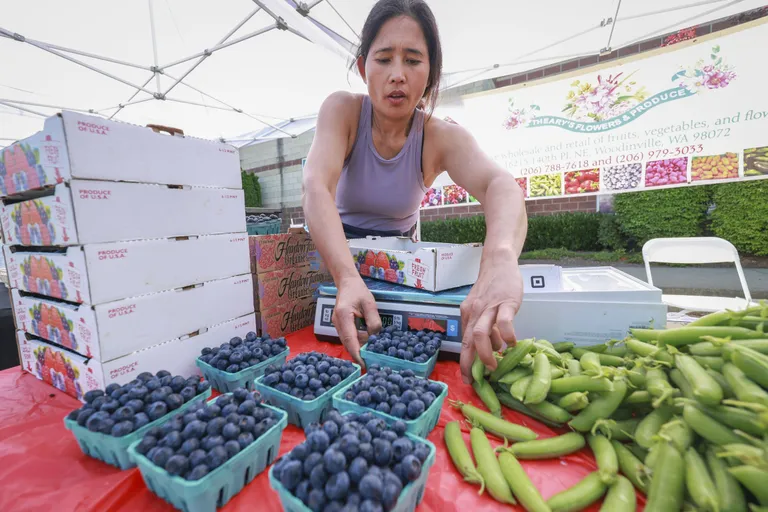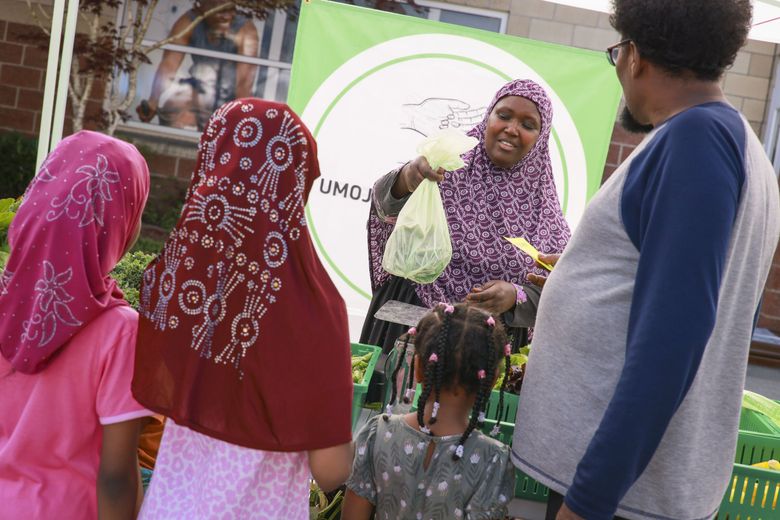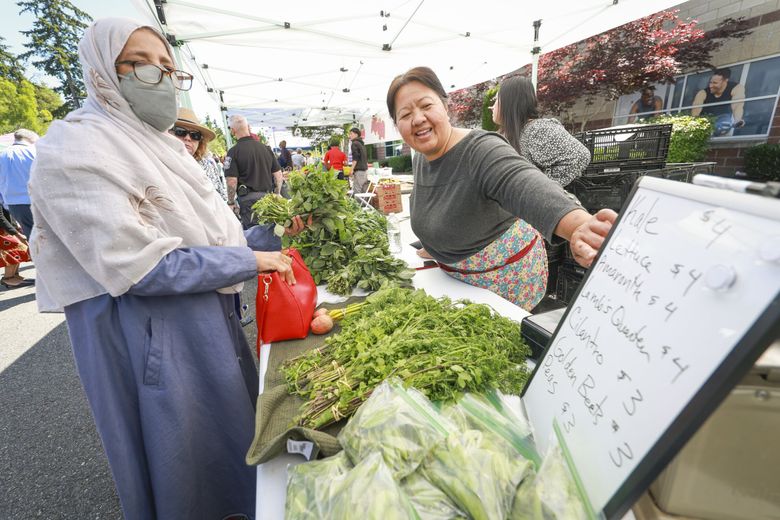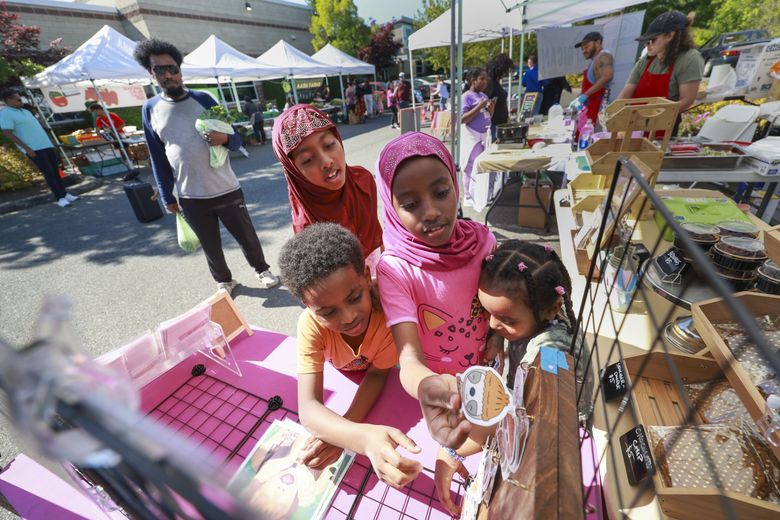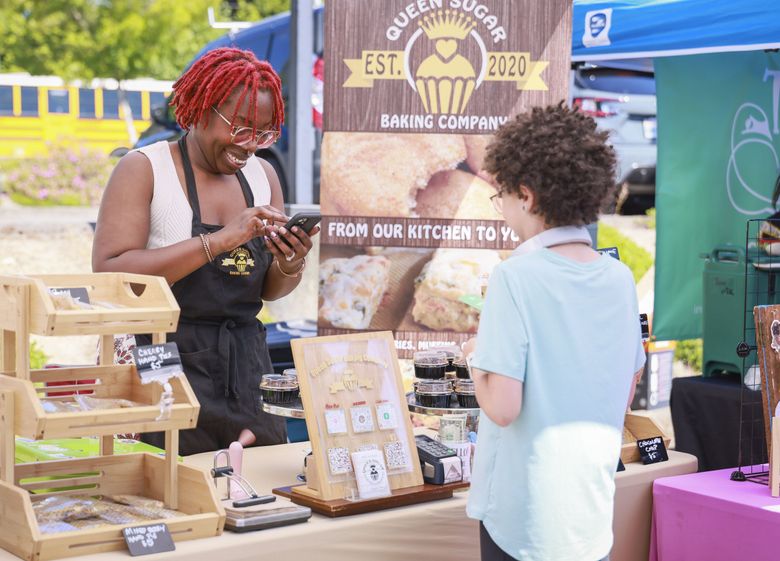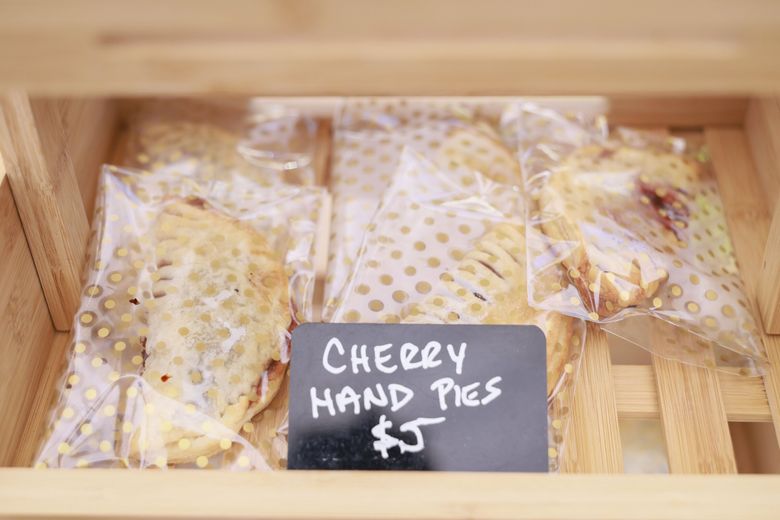SEATAC — When Riddhi Mehta-Neugebauer and her mother spotted the leafy bundles of amaranth at a new SeaTac farmers market, they could hardly believe it.
“Both she and I looked at this like, ‘Oh, we got to get bunches of this, it’s really rare,’ ” said Mehta-Neugebauer, a SeaTac resident who primarily cooks South Asian cuisine. “I hope they keep doing this, it’s wonderful.”
That’s the plan. The African Community Housing & Development launched the new monthly farmers market in SeaTac on Wednesday, following in the footsteps of their successful weekly farmers market in Delridge.
Sourcing foods and goods from farmers, cooks and entrepreneurs of color, the SeaTac Farmers Market will offer culturally relevant dishes and ingredients that local refugee and immigrant communities often can’t find at other nearby markets and grocery stores.
“Whenever I bring culturally relevant food, they say, ‘Are you bringing more, could you bring more, could you bring this and that?’ ” said Beatrice Shimirimana, the owner of Umoja N’Inguvu Farm, as she peeled shoots of green garlic.
Organizers said the new farmers market will serve as an important hub for food access and community-building for racially diverse, low- and middle-income residents in SeaTac, pushing against the stereotype that farmers markets are a place solely for affluent white foodies.
Mehta-Neugebauer scored her bunches of amaranth at Heu’s Blooms and Greens, a Kent Valley farm owned by Nhia Moua that has sold at the Delridge Farmers Market since 2021.
Moua said she likes to grow common vegetables that do well in the Pacific Northwest climate as well as harder-to-find plants like lamb’s quarters and bitter melon.
Last year, she started to grow and sell managu, or African nightshade (different from poisonous nightshade varieties), after her neighbor in Auburn passed along seeds from his family in Kenya. The crop was an instant hit with East and West African customers at the Delridge market.
“I never knew about [African] nightshade, but they eat it heavily,” said Moua, who said she plans to bring the crop to SeaTac later this season. “I never knew that until we started to see they do buy it and they do get excited because you don’t find it in regular retail shops.”
The market will return to Matt Griffin YMCA on the first Wednesday of each month from 3 p.m. to 7 p.m. through November.
Officials with African Community Housing & Development, which is based in SeaTac, said the market serves not only one of the region’s most diverse communities, but also an area with intense need.
In the census tract where the market is located, nearly a quarter of people live in poverty, according to U.S. Census Bureau data. At least a third of the population lives more than a mile away from the nearest large grocery store or supermarket. Many visitors are East African, Southeast Asian or Latino residents who have few healthy, affordable food choices nearby, officials said.
“The families in the community can just walk over, and just seeing that gap bridged is so important,” said director of fund development and communications Zzaj Collins. “You can load up the kids and just walk over and hang out.”
At the farmers market, SNAP benefits are accepted, every child gets $5 to use at any food vendor and people who are food insecure can pick up a free bag of fresh produce.
Sadio Tohobo was among the visitors at the opening day who picked up a bag — filled with kale, blueberries, radishes, snap peas and more — and a whole halal chicken for free.
“I love it,” said Tohobo, a Des Moines resident, scanning the market as she stood near a beauty salon vendor offering henna.
Vendors participate in the market free of charge, and can rent tents and tables for $10. The organization also buys back some of the unsold produce and products at the end of the day to distribute into the community later.
Danitra Porter, owner of Queen Sugar Baking Company, was selling an assortment of pastries and baked goods Wednesday, some inspired by her Southern roots and her travels abroad growing up in an army family.
She launched her small business during the pandemic, using stimulus check money and personal savings to get it off the ground. The Delridge Farmers Market was one of the few markets that catered to the needs of up-and-coming small-business owners and farmers, she said.
The market cultivates a strong sense of community — a place where vendors and shoppers “can come to a market and feel welcome and not feel out of place,” Porter said.
“I’ve been doing so many markets and that feeling when you’re one of the few brown or Black people at the market is just terrible. I’ve had to leave some markets because it’s not welcoming, there’s no community spirit,” Porter added.
Pushing a stroller through the market, Luis Marquez initially stopped by with his son just to check it out. He lives next door to the YMCA.
A frequent shopper at the Burien Farmers Market, Marquez said he was thrilled to see the new market, and appreciated the diverse offerings, free products and $5 for kids. He said he planned to return with the rest of his family next month.
“We go through so much food so quickly,” Marquez said as his son sucked on a hibiscus tea ice pop. “I rather have them eat berries and small vegetables than looking in the pantry for super sugary carb foods.”
Aashay Savla, owner of Aash Farms and a regular vendor at the Delridge location, said he didn’t know how many people would come out to the SeaTac market.
Surveying the dwindling supply of fruits and vegetables on his table after the market’s first hour, he said he was overwhelmed by the turnout.
“I’m shocked this many people came out, I’m feeling very, very supported right now,” Savla said. “The support I’ve seen, people are stoked, they’re like, ‘We’re so glad to see you here — I can’t believe it’s taken this long.’ ”




